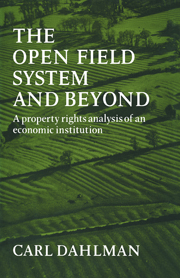Book contents
- Frontmatter
- Contents
- Preface
- 1 Introduction
- 2 Theories of the open field system
- 3 Property rights, transaction costs, and institutions
- 4 The economics of commons, open fields, and scattered strips
- 5 The economics of enclosure
- 6 Some extensions and generalizations
- Bibliography
- Index of names
- Index of subjects
6 - Some extensions and generalizations
Published online by Cambridge University Press: 07 October 2011
- Frontmatter
- Contents
- Preface
- 1 Introduction
- 2 Theories of the open field system
- 3 Property rights, transaction costs, and institutions
- 4 The economics of commons, open fields, and scattered strips
- 5 The economics of enclosure
- 6 Some extensions and generalizations
- Bibliography
- Index of names
- Index of subjects
Summary
After having presented a theory for the open field system and its demise in the enclosure movements, one task remains : to generalize that theory and see if it contains anything that can allow for some insight, however small, into the much wider problem area of the choice of institutional arrangements in general. If the economic theory of the choice of institutions in the open field system presented here has some validity, it ought to follow that we should also find clues to the correct interpretation of other similar institutions in the methodology employed. We shall see that this indeed is the case, and that the general ideas employed throughout this study have some applicability when it comes to understanding the processes by which institutions emerge, persist, and eventually become replaced with newly emerging institutions. In order to accomplish this, we shall also have to discuss the relationship between the standard theorems of the property rights literature referred to in Chapter 3. More specifically, we shall have to show how the contention that collective ownership indeed can be consistent with private wealth maximization can be justified in view of the works of Cheung and Demsetz which purportedly show the superiority of private property rights over collective.
The efficiency of collective ownership
In Chapter 3 we referred to a recent paper by Cheung concerning the proof of the inefficiencies associated with communal ownership.
- Type
- Chapter
- Information
- The Open Field System and BeyondA property rights analysis of an economic institution, pp. 200 - 222Publisher: Cambridge University PressPrint publication year: 1980



